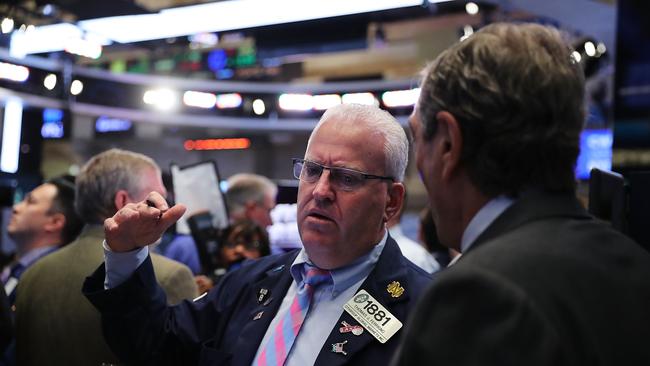Wall St inches higher after Fed minutes
The ASX is set for a soft open after US stocks got only a modest bounce from the Fed’s September minutes.

Shares fell in Europe, as investors worried about the effect of high interest rates and digested British plans to allow parliament a debate over the Brexit process, while the pound hit an all-time low against a basket of currencies.
The Australian share market is set for a soft open, with ASX futures down 15 points at 7.30am (AEDT).
Investors had come to expect that the Fed would raise short-term interest rates in December, with recent comments from Fed officials bolstering the case. But minutes from the Fed’s September meeting show that while some policy makers called for a rate increase “relatively soon,” members clashed over the timing of the move.
Income-paying stocks led Wednesday’s gains, recovering slightly after falling out of favor in recent months. Yield-hungry investors had bid up these sectors for their dividend payments in the first half of the year. Real-estatestocks in the S&P 500 rose 1.3 per cent, while utility stocks rose 1 per cent.
“The yield play is happening because people are going to question whether or not the Fed is actually going to pull the trigger in December, “ said Ray Moore, a trader at Raymond James. “The market interpreted the Fed minutes and believes a rate increase this year is less likely.”
The Dow Jones Industrial Average edged up 16 points, or 0.1 per cent, to 18144. The S&P 500 rose 0.1 per cent, while the Nasdaq Composite edged down 0.1 per cent.
In bonds, the yield on the 10-year US Treasury note rose to 1.778, paring gains after investors found little in the Fed minutes to reaffirm expectations of a rate increase before year-end.
Investors are now turning their attention to earnings. Aluminum giant Alcoa fell 2.9 per cent, a day after losing 11 per cent from announcing disappointing third-quarter earnings, kicking off the US earnings season on a down note.
In the three quarters in which Alcoa has fallen more than 10 per cent following its report, the S&P 500 traded down 7.5 per cent, 2.6 per cent, and 6.5 per cent for the remainder of those three earnings seasons, according to Bespoke Investment Group.
Shares of Illumina fell 2 per cent, after tumbling 25 per cent a day earlier on news that the company was cutting its revenue guidance. Health-care stocks in the S&P 500 led declines for the second session in a row, while the Nasdaq Biotechnology Index lost 2.5 per cent.
US crude oil fell 1.2 per cent to $US50.18 a barrel after the Organization of the Petroleum Exporting Countries said its production increased last month. OPEC members had reached an agreement last month to cut production, though details on how to execute are still being negotiated.
Overseas, the Stoxx Europe 600 fell 0.5 per cent. The British pound rose to $US1.2207 after four consecutive days of losses. The pound touched a historic low against a basket of currencies Tuesday, according to Bank of England data. It recovered during Asian trading hours, rising more than 1.5 per cent against the dollar, after media reports suggested that UK Prime Minister Theresa May had agreed to hold a parliamentary vote on her plans for taking Britain out of the European Union.
London’s export-heavy FTSE 100 index, which touched its highest level in decades Tuesday, pulled back 0.7 per cent as the British currency recovered.
The WSJ Dollar index, which measures the dollar against a basket of 16 currencies, rose 0.2 per cent.
Earlier, shares in Asia fell on continued expectations for a US rate increase in December. Japan’s Nikkei Stock Average fell 1.1 per cent, while the Hang Seng Index fell 0.6 per cent.
Dow Jones





Most US stocks were only slightly higher overnight as Federal Reserve minutes offered investors few new insights about the next interest-rate increase.